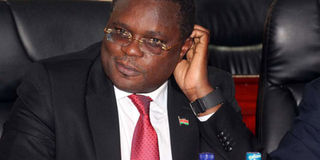Disregard for procurement rules threat to devolution

Bungoma Governor Kenneth Lusaka appears before the Senate Finance committee on September 16, 2016 at County Hall. He was questioned why he allowed more than Sh300 million to be deposited in a personal account. PHOTO | DENNIS ONSONGO | NATION MEDIA GROUP
What you need to know:
- The Senate also noted that some governors deliberately declined to pay for goods and services delivered.
- They observed that many masterminds of serious financial flaws were walking scot-free due to failure by investigating agencies.
Single sourcing and variation of tenders in total disregard of procurement laws are posing serious threats to the success of devolution.
With a growing appetite to pocket billions allocated to counties each financial year, governors are not patient to go through procurements as prescribed by law.
So serious is the trend that some governors are banking public funds in individual accounts, yet county governments have opened many accounts.
Senate watchdog committee members have raised the red flag, saying glaring breach of the law, if not addressed, will see the next crop of governors struggle with huge pending bills.
Pending bills usually affect the subsequent year’s budget implementation because the new bosses have to prioritise their settlement or spend funds on litigation.
152 ACCOUNTS
Finance committee chairman Billow Kerrow took issue with Bungoma Governor Kenneth Lusaka, questioning why he allowed more than Sh300 million to be deposited in Ms Lilian Wafula Namukhasi’s personal account.
“The county government has 152 bank accounts for both the executive and the county assembly, but it still affords to deposit public money in private accounts. Counties are bleeding,” Mr Kerrow said when he tabled the damning report on wastage of public funds at counties.
The committee noted that the deposits were accompanied by correspondingly large withdrawals.
The governor, who was given an opportunity to explain the matter, failed to account for the transactions.
“This may indicate misappropriation of public funds and a bid to circumvent the law,” Mr Kerrow said in response to a petition by Bungoma residents.
IMPREST HOLDER
The committee recommended that the Ethics and Anti-Corruption Commission (EACC) and the office of the Director of Public Prosecutions (DPP) investigate the matter to safeguard public funds.
“The agencies should immediately institute and undertake criminal proceedings against the governor, the County Treasury and Ms Wafula,” the report before Senate reads.
The committee said if the allegations are substantiated, the governor should be removed from office as contemplated in the Constitution.
The governor, in response, said the funds were for imprest, and that the Public Finance Management regulations for counties state that such funds shall not be kept in an official bank account, but in a separate or personal account operated by the imprest holder, or in form of cash in a safe.
The committee further observed that, like in many other counties recording far below their projected revenues from local collection, money deposited to the Bungoma County Revenue Fund does not reflect the true revenue generated in the county.
PAYING FOR SERVICES
There was no evidence that Sh1.4 million out of Sh1.7 million that was supposed to be refunded from a county employee, Mr Mwalati Kalawanga, for making fictitious deposits, had been recovered.
The Senate also noted that some governors deliberately declined to pay for goods and services delivered, which is against the Public Procurement and Disposal Act.
The Act says that a procuring entity shall not commence any procurement procedure until it is satisfied that sufficient funds have been set aside in its budget to meet the obligations of the resulting contract.
“This is a bigger public policy issue. The law says: don’t procure if there is no money. This is an illegality being committed by both levels of government,” Senator Kipchumba Murkomen (Elgeyo-Marakwet) said.
West Pokot Senator John Lonyangapuo claimed that some county governments were frustrating suppliers because they wanted to be bribed, yet some traders’ properties were at risk of being auctioned over defaulted loans.
“County governments’ refusal to pay is pegged on how you give kickbacks. County assemblies that are supposed to oversight such malpractices are dead asleep,” he said.
DISCIPLINING GOVERNORS
Mr Kerrow said the National Treasury Cabinet Secretary has powers to suspend allocations to counties due to breach of public finance management regulations.
“Those affected can formally write to Treasury. The Controller of Budget will have to investigate and submit a report to Treasury to suspend transfer of funds to county governments that fail to honour contractual agreements,” he said.
The committee further appealed to the EACC to fast track investigations into why Mr Lusaka spent more than Sh1.5 million to investigate inflation of wheelbarrow prices to Sh109,000 when the market price was about Sh3,000.
The lawmakers also raised concerns over slow implementation of House resolutions, especially petitions that are usually presented to Parliament by the public.
They observed that many masterminds of serious financial flaws were walking scot-free due to failure by investigating agencies and relevant parliamentary committees to take action.
STANCH FUNDS WASTAGE
They criticised the Senate implementation committee chaired by Siaya Senator James Orengo, whose mandate is to monitor and ensure that what is agreed on in the House is implemented,.
The senators were infuriated when temporary Speaker Wilfred Machage said a report of a petition on financial flaws at Bungoma County be sent to the petitioners, without explaining how those suspected to have misappropriated public funds should be dealt with.
Mutula Kilonzo Jr (Makueni) reminded the members that the Senate has been accused of watching helplessly as governors pilfer public funds.
Senate Minority Leader Moses Wetang’ula (Bungoma) said: “It is only fair, not just to the House but to the petitioners, that a follow up is done to ensure that those who waste public funds face the law.”





